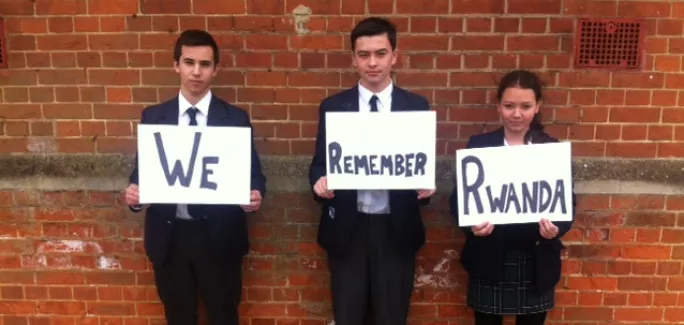Rwanda: UK students remember 20 years since the genocide through film
“This is the story of one man, woman or child being murdered. And another. And another. Until one million lay dead.”
With these words, students from St John’s School in Surrey introduce their new film, marking the 20th anniversary of the genocide in Rwanda. We Remember Rwanda, a 10-minute film, aims to teach a new generation about the brutal events of 1994.
“I’d heard about the Holocaust, but I hadn’t heard about this,” said 15-year-old Louise Barr, who narrates sections of the film. “So it was a really big shock.”
The students decided to make a film about the Rwandan genocide after a recent report suggested that 80 per cent of young people had not heard of the 1994 massacre of the Tutsi ethnic group by their Hutu compatriots.
“We went down to the local town and said to people, ‘Do you know what happened in 1994?’” said Andy Lawrence, director of teaching and learning at St John’s. “We got answers like, ‘Kurt Cobain died’ or ‘The World Cup in America’, but nothing about Rwanda.”
The students then watched a TV documentary about the Nazis, in order to work out what a good documentary film should include. The programme was narrated by the actor Samuel West. The students contacted Mr West’s agent and asked if he would provide some of the narration for their film, too. He agreed.
They then emailed journalists Lindsey Hilsum and Mark Austin, who had reported on the conflict for Channel 4 News and ITN respectively. Both agreed to be interviewed for the documentary.
“There is no hope of preventing - stopping - genocide or mass-killing, these kinds of tragedies or disasters, if you don’t learn the lessons of history,” Ms Hilsum told the cameras.
The film-makers also interviewed a Tutsi woman who survived the genocide by hiding in a tree in the garden, while her family was killed at home. And they were given access to ITN footage of the massacres.
“There was footage of lots and lots of dead babies,” said 14-year-old Charlie Joyce, who was involved in filming and editing. “We couldn’t really put it in the film. It was horrific to watch.
“I was quite shocked by how people didn’t react to the massacre when it happened. Maybe it wasn’t covered enough in news programmes and newspapers, so people weren’t aware of the extent of the killing that was carried out.”
“It was difficult working with the footage,” agreed 14-year-old Callum Trevitt, who also edited the film. “You see children who are younger than you, or the same age. The Hutus didn’t kill the children, but they scarred them for life. They chopped off their fingers. So, yeah, that was quite hard to watch.”
The film-makers, however, resolved to focus on individuals, rather than on mass killings. “We didn’t want the point to be: here are lots of dead people,” said Mr Lawrence. “It’s: here are people with lives and hopes and dreams like us, and their lives have been extinguished.
“It’s their humanity that’s the point, rather than their death.”
We Remember Rwanda is available online.
Related links:
Rwandan schools bear the weight of history
Keep reading for just £1 per month
You've reached your limit of free articles this month. Subscribe for £1 per month for three months and get:
- Unlimited access to all Tes magazine content
- Exclusive subscriber-only stories
- Award-winning email newsletters




